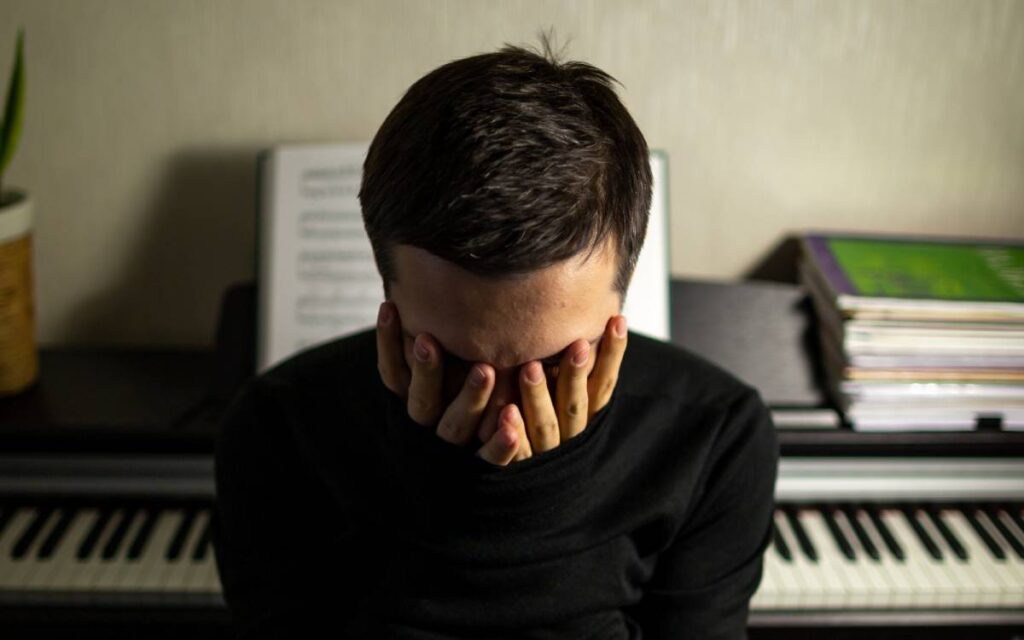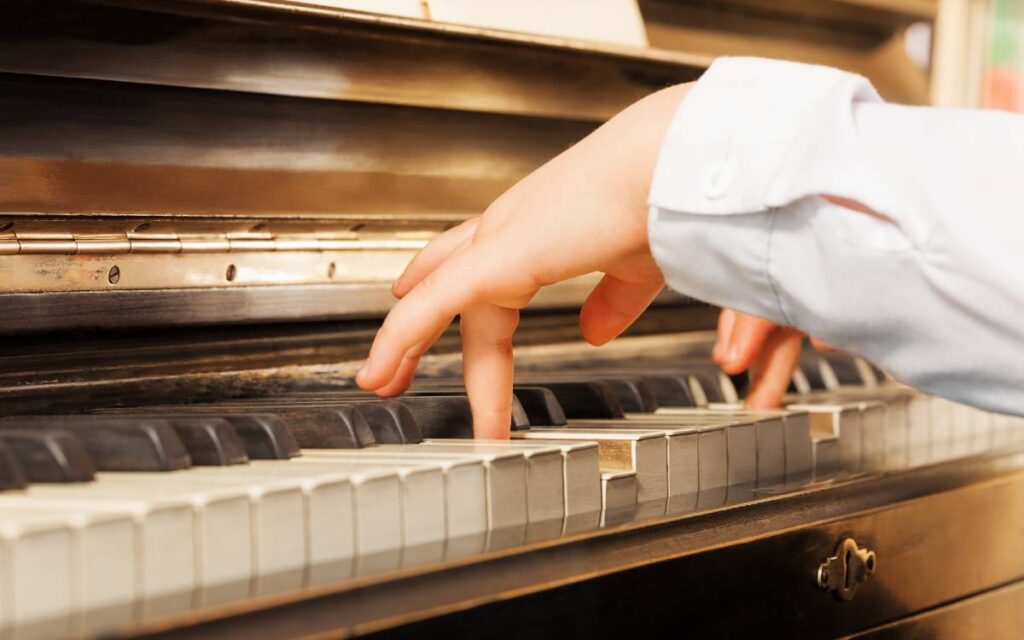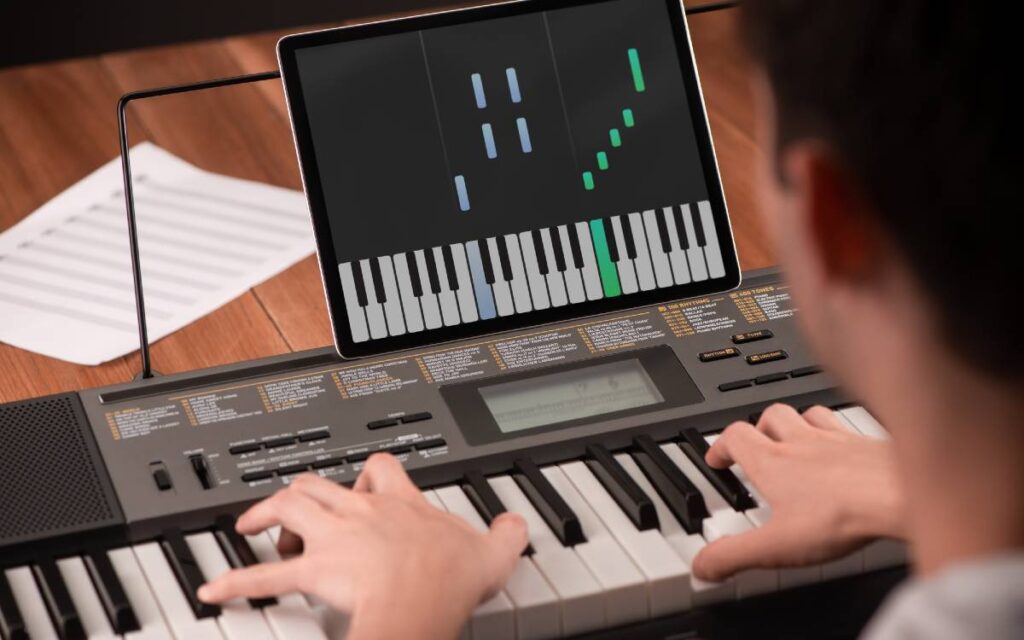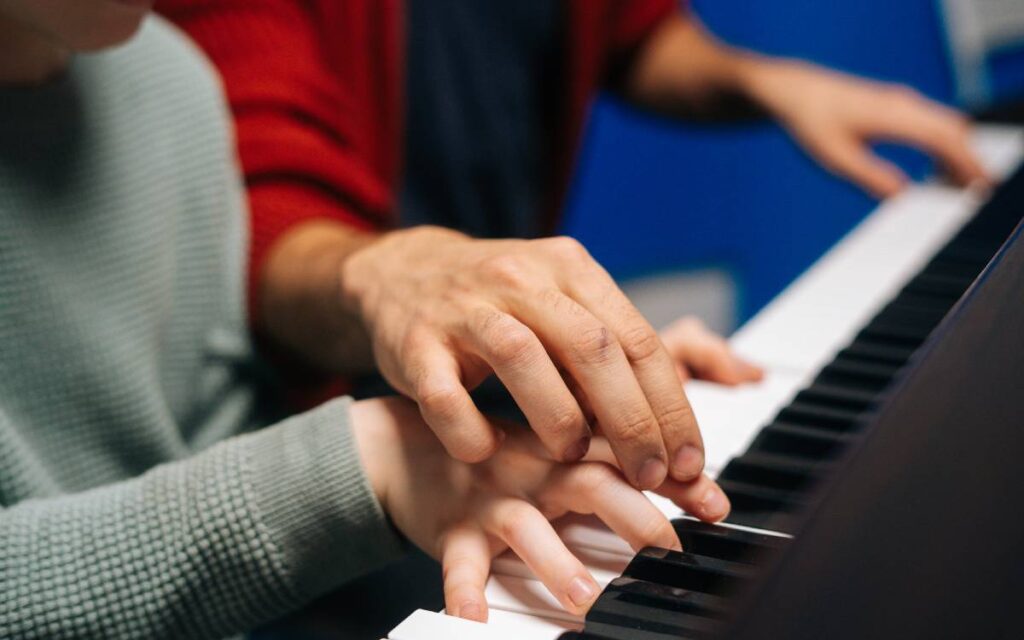When you look at an expert pianist effortlessly playing the piano, you may think it’s out of your reach, and you will never play up to their standards. You can become intimidated by the path ahead, especially when you compare your end goal with your current skills. As a piano student, you can stay motivated to practice by breaking this down into smaller goals.
But one day you forget to practice. Soon the days turn into weeks, the weeks turn into months, and before you know it, you’ve lost your piano motivation and you stop practicing.
Post Contents
First – It’s Okay to Lose Your Motivation

If you feel yourself losing motivation to practice – don’t worry, it’s normal. It happens to all of us at one time or another.
As with learning any instrument, motivation will come and go depending on how you feel.
Sometimes you will feel like you can’t wait to start a practice session and learn something new. But there will also be periods when you just don’t want to practice, and sometimes those periods can stretch into weeks. Before you know it, you’re no longer practicing.
No one said that learning to play the piano was easy. It can be a real effort to take the time to practice piano. Sure, expert pianists make it look like a breeze, but the truth is, piano is a challenging instrument for students to learn, so don’t let other’s skills put you off.
Those pianists that you so admire were piano students once upon a time. They have spent years and years practicing to make their piano playing look simple. But remember, they had periods where didn’t want to practice either!
So give yourself a pat on the back for starting a journey that most people will never do.
This article explains how to find and, more importantly, maintain your desire and motivation to play the piano.
Tip #1: Set Proper Goals
Setting goals is probably the easiest way to stay motivated. But for goal setting to be most effective, you need to be precise about what your goal is.
Do you want to play a specific piece of music? Are you practicing for a performance? Do you want to learn a particular scale? Do you want to improve your sight-reading?
Once you have your goal clear in your mind, there are several ways that you can work towards achieving it.
Use Smaller Accomplishment Goals
When learning a new piece, break it down and set goals that are smaller. Maybe you decide that you will learn to play the right hand of the first five bars by the end of the week. Once you have achieved that, move on to your next challenge. This is a great way to stay motivated.
If you want to learn a specific piece of music, set a goal date. Maybe it’s January, and you want to play a piece by March. Put the date in your calendar and little by little work towards that date.
Are your goals achievable?
We know that you are probably bursting to play that complicated piece, and you’ll get there so long as you set achievable goals along the way.
Announcing that in six weeks, you’ll be playing “Clair De Lune” may be a little too optimistic – unless you’re a concert pianist, of course!
Often when you give yourself small, achievable challenges, you feel more positive and are more likely to stay motivated when you complete them.
Start setting small goals for yourself, and slowly work up to more and more complex challenges. It may take time, but it will be worth it in the end.
Tip #2: Decide How Long you Want to Practice Piano
Each time you begin to practice, set a timer first thing. Begin with 15 minutes and work up from there. Where the timer beeps, stop, and get up from the piano. Stretch and take a quick break, then either go back and do another 15 minutes or stop practicing.
Either way, you’ll have done your practice for the day.
Practicing the piano for hours on end can eventually dampen your enthusiasm. It’s far better to practice in short bursts.
Tip #3: Don’t get stuck on one piece of music
You may initially feel excited to learn that classical piano piece, or that fun pop song on the piano. But if it’s taking you longer than a month to master a piece, maybe it’s time to move on for a bit. It can get boring when you keep working on the same piece for too long, and you could grow to hate it. That would be a real shame if you really loved a piece of music and now you can’t bear to listen to it.
Give yourself a break and work on something else for a while. You can always come back to that original piece, and when you do, you may find it easier to play than before.
Tip #4: Make Piano Practice Fun

It’s easy to forget why you wanted to learn to play the piano in the first place.
Is it for a fun hobby? Do you want to play in a band? Are you learning so you can play for an audience of friends and family? Whatever your reason, keep it fun.
One of the most satisfying reasons for learning the piano is to enjoy the feeling of being creative, of playing your own music or music that you love. If you only ever learn complicated pieces, it can quickly take the joy out of the whole experience.
So, if you’re struggling to get motivated to learn a song, simply sit down and start playing. It doesn’t have to sound great, just put your fingers on the keys and see what happens. Relax, don’t be too serious, and just enjoy playing.
Tip #5: Make Time to Practice
You may have heard the phrase, “If you don’t schedule it in, you schedule it out!” What that means is, if you don’t set specific times aside for practice sessions, they may never happen.
When you’ve decided on a time, put it in your calendar and stick to it. Don’t just wait for inspiration. It could be half hour, or even ten minutes. Life is busy for us all, and it can quickly get in the way of us doing the things that bring us the most joy.
If you put the time in your diary for piano practice, you are far more likely to stick to it.
Tip #6: Gamify your Practice

That’s right, turn your practice into a game. There are plenty of phone apps available that help you gamify your life, which is a great thing for any new habit.
Find an app where you can set yourself small goals and challenges, and when you meet the goals, reward yourself.
If you feel like it, you could even make yourself a goal chart with stickers. Do whatever makes you feel good.
Tip #7: Structure Your Practice
When you sit down to practice, begin with a few warm-up techniques. Going through your scales and arpeggios may feel like a chore, but it will help you become a better pianist in the long run.
Next, pick up a simple piece of music that you enjoy and know well. Once you’ve played that a few times, you’re ready to tackle a more challenging piece.
Following this routine each time you sit down and play will make for a more satisfying practice session.
Tip #8: Remember how you feel after you practice
How did you used to feel after a practice session? Did you feel great? Like you had accomplished something?
When you play the piano, incredible things happen to your brain. Whatever age you start to learn the piano, your brain benefits. It helps with depression, lowers blood pressure, improves your memory… we could go on.
In short, practicing the piano is a bit like exercise. You don’t want to do it beforehand, but after you do, you feel great!
So, the next time you finish your practice time, take a moment to reflect and think about how you feel.
You want your piano practice to feel like a positive thing rather than a negative, and this little trick will help you do that.
Tip #9: Find a Piano Teacher

There are so many ways to learn how to play the piano. You no longer have to follow the more traditional route of finding someone to teach you piano.
There are books and online courses. You can watch YouTube videos and there are even apps that promise you’ll be playing like Elton John in no time!
However, the most significant benefit to learning with a piano teacher is that you have someone to be accountable to each week. A good piano teacher will know how to motivate students.
Nothing makes you practice piano more than knowing you will be sitting in front of someone showing them what you have achieved that week. The downside is that piano lessons can be expensive, so maybe you know a friend who will give you some free lessons.
The other benefit to having piano lessons is they can help you set your performance goals. It also helps to be in the same room your instructor is teaching piano. You may also get the chance to talk to other students and see how they are getting on.
A piano teacher can answer your questions and put your mind at rest if you feel you are not progressing fast enough.
Tip #10: Keep Listening to Music
You may not feel like playing the piano yourself, but don’t let that stop you from listening to music. Put a record on the turntable, find a Spotify playlist, or even turn on the radio.
Hearing some of your favorite music can reignite that spark and make you feel inspired to perform a favorite song.
Remind yourself how much you love music and why you wanted to start learning the piano in the first place.
Going to watch live music can help too, and it doesn’t have to be piano music. Go and see your favorite band and get a feel for live music again.
Tip #11: Look Back at Your Progress
It’s easy to feel despondent when you compare yourself to other pianists. You may look at other people playing piano and think you’ll never get to that skill level. The trick here is to look back and see how much progress you have made.
An excellent way to do this is to take a piece of music that you first learned when you started and see how easy it is to play now. You might be surprised when you see just how far you’ve come. Another method is to keep a practice journal to track your progress.
Tip #12: Use Visualizations
Take some time out to sit and visualize yourself playing the piece you want to learn. You don’t even have to be seated at the piano when you do it. You could be sitting in a chair or even lying in bed.
See yourself reading the music and watch your hands as they hit the notes. Sound crazy? Not really. Anyone who is at the top of their game, from musicians to athletes, has probably used some visualization techniques.
So if you don’t have the motivation to sit down and play piano, imagine yourself playing it in your head.
Tip #13: Be Kind to Yourself

Don’t give yourself a hard time if you feel you aren’t progressing as much as you want. It’s easy to tell yourself that you’re no good and you’ll never achieve the results you want.
No matter what instrument you learn, it takes time and lots of practice sessions, but it should be enjoyable too. So just go with how you feel and give yourself a break.
If you play a wrong note or two, try not to tell yourself how terrible you are. Instead, think about what constructive criticism you could give yourself.
How could you make it better? Should you go away and have a cup of coffee and then come back to it?
Remember, it’s okay to get things wrong. After all, that’s how we learn to do better and you’ll be a great piano player in no time.







